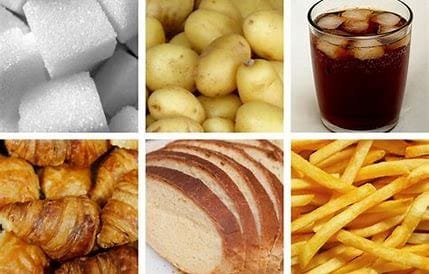The Role of Refined Carbohydrates in Weight Loss:
Understandably, for long, the controversy surrounding weight loss often placed carbohydrates at the center. More so, it is refined carbohydrate, especially that found in sugary foods, white bread, pastries, and pasta, which has been famously indicted for causing weight gain as well as diabetes and heart diseases. But what is the true impact of refined carbs on weight loss, and why do authorities prescribe fewer of them as a way to good health and a slimmer waist? The article approaches the topic from various angles and thus offers an interpretive understanding of the connection between refined carbohydrates and weight loss.
What are refined carbohydrates?
Refined carbohydrates are processed foods that have removed the natural fiber and nutrients that occur with whole grains. In doing so, wheat and rice lose their bran and germ, which happen to be the most nutritious parts of the grain. What, therefore, remains is basically starch that will give quick energy but without the fiber, vitamins, or minerals.

Some common sources of refined carbohydrates are:
White bread
Pasta made from white flour
Sugary cereals
White rice
Baked items and cakes
Carbonated and sweet drinks
All these foods result in relatively rapid spikes in blood sugars because they are nearly immediately broken down into glucose, and thus that leads to an almost immediate spike in insulin levels as well. Over the course of many years, this further causes obesity besides also causing resistance towards insulin, which creates more burden on losing any kind of weight.
Scientific Method: How Refined Carbs Impact Weight
From a scientific aspect, low intake of refined carbohydrates leads to weight loss mainly by influencing blood sugar levels and hunger hormones. Refined carbohydrates promote speedy digestion and absorbance into the body system and lead to an elevation of blood sugar. After this peak comes an extreme drop that causes hunger shortly after meals, thereby promoting overeating and snacking.
Studies have shown that diets rich in processed carbohydrates lead to increased calorie intake, obesity, and fat accumulation, which is mainly found in the abdominal cavity. As refined carbs are easily digested, this person feels less filled up and has to eat more often to feel once more. On the other hand, whole grains and complex carbohydrates that digest for a longer period of time enhance fullness and minimize overeating.
In a review published in The American Journal of Clinical Nutrition, researchers showed a comparison of those who consume more refined carbs compared to those who have more whole grains and fiber in their diet. They are likely to gain weight and end up with metabolic syndrome. Making the replacement of refined carbohydrates for whole grains, fruits, and vegetables may lead to weight management and overall better metabolic health.
Controlling Cravings and Hunger from the Practical Perspective
To most people, reducing refined carbohydrates is easier said than done. Refined carbs are the staple of the Western diet, incorporated into many of the most convenient and inexpensive foods. However, many nutritionists argue that all that’s necessary to achieve a good benefit is to decrease them.
There is also the potential to control refined carbs, though, through quality carbs intake, where, for instance, one can substitute white bread with whole-grain bread or brown rice instead of white rice, so this is not quite the massive burden either. Increasing the amount of fiber in food also helps to control hunger, as this takes longer to digest, keeping one fuller for a longer time.
Moreover, the high-glycemic carbohydrates stimulate the cravings because of a rapid fluctuation in the blood sugar levels. The craving for such a product result in consuming more sugary or starchy stuff and thus can lead to overeating in a cyclical manner. Replacing refined carbs with protein and healthy fats will stabilize blood sugar levels, reduce cravings, and help in losing weight.
The psychological perspective: Food and mood relationship
Refined carbohydrates are not only bad for your body; they could be playing tricks with your mind as well. The short-lived energy boost of such a thing may have you feeling great while it’s here, but when the sugar is gone, coupled with falling blood sugar, it can become fatigue and irritability, even to the point of depression. The rollercoaster of blood sugar can leave you drained, both motivation-wise and in terms of energy, making it rather a challenge to keep sticking to a weight loss plan.

Refined carbohydrates can also provide another source of psychological comfort that leads to emotional eating. Such behaviors usually interfere with the weight loss process since they promote overeating unwholesome foods. Not engaging in emotional triggers and replacing them through fruits, veggies, and whole grains helps to ensure not only weight loss but also mental wellness.
To this end, mindful eating habits are of particular relevance. Take note of the physical and emotional responses to refined carbohydrates; note your choices, being discerning about how these foods are impacting your overall well-being.
The Cultural and Economic Perspective: Access and Habit
Generally, refined carbohydrates are the staple diet in most cultures because they are affordable and readily available. Refined carbohydrate-rich diets include those consuming large amounts of white rice and bread. While whole grains may be healthier, they are often more expensive and less easily accessible, especially in disadvantaged communities or food deserts.
Economic constraints also form some of the factors. Refined carbs tend to be cheaper than fresh fruits, vegetables, and whole grains. Therefore, it is inevitable that people consume more processed and refined carbohydrate-rich foods since it is a strain on their economy.
Yet change entrenched habits—they are also challenging to alter. People have been conditioned to rely on refined carbohydrates from a young age, and these foods are deeply embedded in their routines and cultural practices. However, changes, such as switching from white rice to brown or whole-grain bread, make healthier eating more accessible and do not alienate people from their traditional diets.
The balanced approach: Moderation, Not Elimination
The thing to know about carbohydrates is that not all carbs are bad, and neither is cutting out carbs in total practical or necessary. It’s the type and quality of carbohydrate that can determine the successful direction of weight loss as well as promote long-term health.
The goal is not to demonize these foods but to understand where they fit and consume them in that framework. Combining refined carbs with protein, healthy fats, and fiber can somewhat offset the negative impact on blood sugar and hunger that comes from these macros.
Conclusion: A Multifaceted Approach to Weight Loss
Reducing refined carbohydrates is just one part of the solution to losing weight, but effectively losing weight. Understand how refined carbs affect blood sugar and cravings generally, as well as overall health. But equally important are the practical, psychological, and cultural factors affecting food choices. The bottom line, therefore, is that it is possible to achieve sound, long-lasting weight loss by simply taking a balanced approach and adding more whole foods, more fiber, and more nutrient-dense options to your diet.




